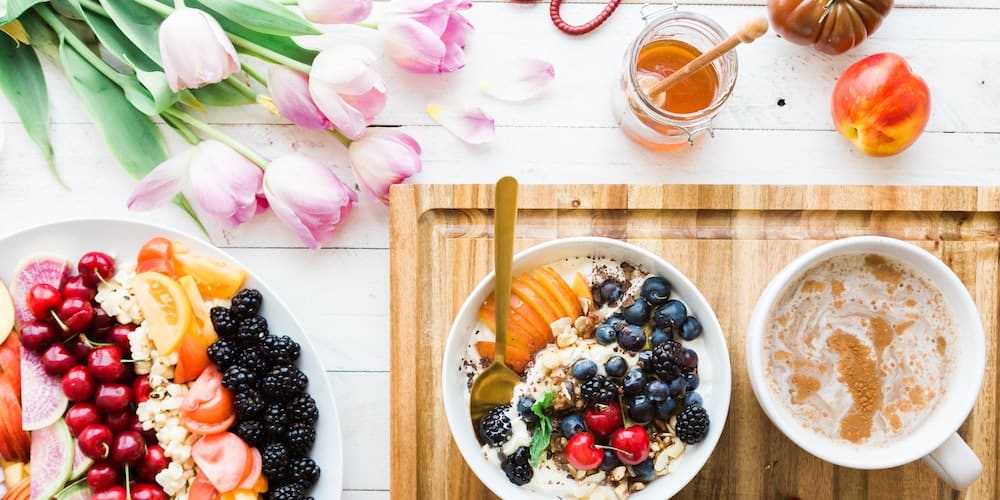Le petit déjeuner est le repas qui rompt le jeûne nocturne. Quelle est la composition d’un petit déjeuner équilibré ? Voici les 5 aliments à déguster le matin pour un premier repas sain et nutritif.
To find out the National Nutrition and Health Program’s recommendations, see after the list.
1. A hot drink without sugar
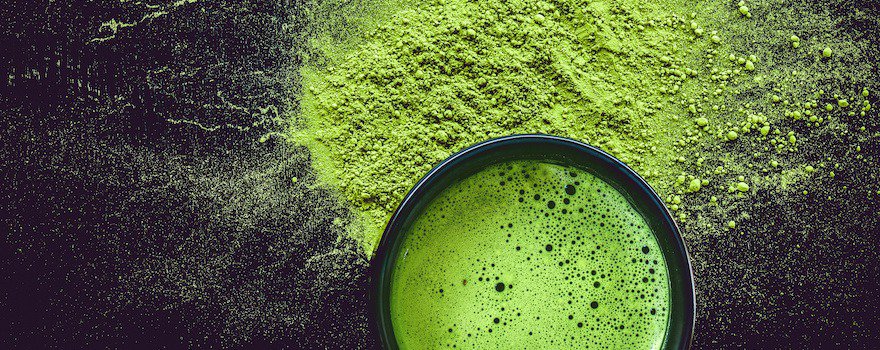
Drinking a hot beverage is recommended upon waking to raise body temperature. During the night, our temperature falls before gradually rising until waking.
This little boost is even more welcome in winter!
In addition, upon waking, it’s important to hydrate the body. Our body is made up mostly of water (between 55% and 75%). It is essential to maintain good hydration throughout the day, starting as soon as you wake up.
Have a glass of water in addition to your hot beverage for optimal hydration.
Ideal hot drinks : the green tea is an excellent option to start the day. It contains theine, the same molecule as caffeine, which stimulates brain functions. It is also rich in antioxidants. You can opt for matcha, which is even more concentrated in theine and antioxidants.

Coffee is, of course, a possible option, but be careful not to exceed the recommendations — one to two cups per day (risk of hypertension in particular). Two interesting and equally stimulating alternatives: yerba mate and cacao.
Caffeine-free options: You can also vary with caffeine-free drinks such as chicory, rooibos, or a ginger infusion that gives a boost.
2. A protein-rich food
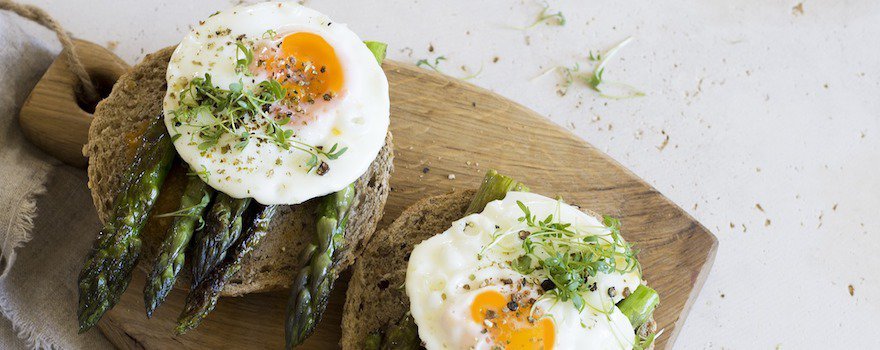
Proteins are macronutrients made up of a chain of amino acids. They play a fundamental energetic role. Protein needs are higher for athletes than for sedentary people.
Satiating, they help reduce snacking in the morning. Animal proteins are complete because they contain all the amino acids.
Ideal animal protein: it’s not easy to eat a piece of meat first thing in the morning! For animal proteins you can opt for eggs. Hard-boiled, in an omelet, scrambled, soft-boiled, there are many possibilities.
Or a slice of cooked ham, a small portion of smoked trout.

Dairy products such as milk, yogurts and cheese also contain good amounts of protein. Preferably choose a plain yogurt or plain fromage blanc that you can sweeten with a little honey or stevia, for example.
Milk kefir provides a boost of probiotics first thing in the morning. For cheese, you can have a portion of feta or fresh goat cheese.
Ideal plant proteins: the plant proteins are a good alternative for people who follow restrictive diets or who want to vary their protein intake. The spirulina is an excellent source of plant proteins. You can enjoy it in a smoothie with banana and oat milk, for example.
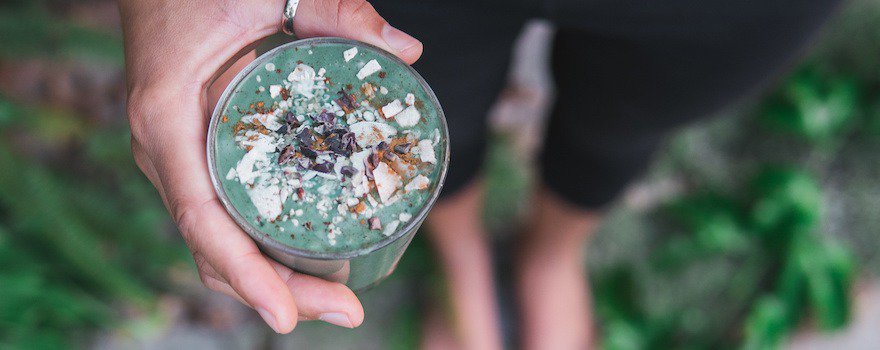
Tofu, derived from soy, is also rich in protein. Legumes like white beans and chickpeas can be easily incorporated into breakfast in the form of hummus or purée!
Seeds like sesame, sunflower and almonds are also easy to snack on first thing in the morning.
3. A fresh fruit, preferably seasonal
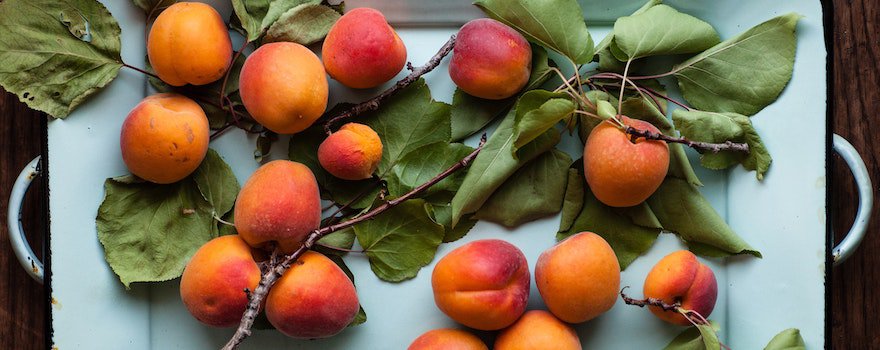
Eating a fresh fruit in the morning is the best way to provide the body with vitamins and minerals. Vitamin A is essential for the health of our skin and eyes. Fruits rich in carotenoid pigments contain beta-carotene, the precursor to vitamin A.
Vitamin C, synonymous with energy, boosts the immune system.
Preferably eat fresh fruit, not juice, to benefit from their fiber content.
Fibers improve intestinal transit and can act as appetite suppressants. They also slow the absorption of the sugars present in fruits.
Ideal fresh fruits: in summer, apricots and melon are particularly rich in beta-carotene. The blackcurrants are packed with vitamin C, as is the pomegranate. The kiwi is rich in antioxidants and fiber. In winter, feast on apples and citrus fruits.
It’s best to follow the rhythm of the seasons to enjoy fresh fruits with high nutritional value.
4. Good carbohydrates (low or moderate GI)
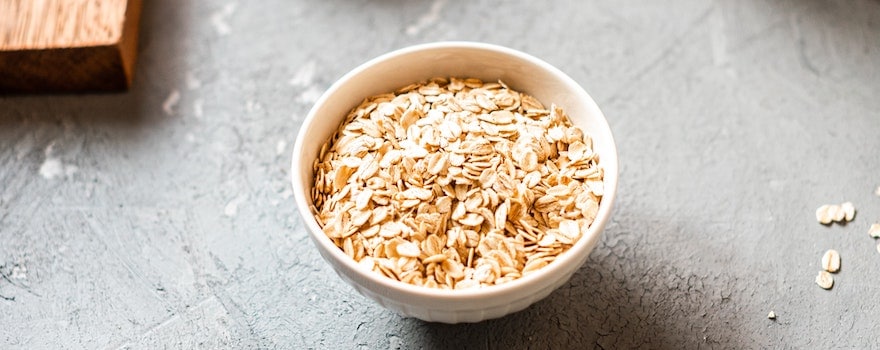
Carbohydrates are the fuel for muscles and the brain. It’s easy to see why they should be included at breakfast! In addition to providing energy, they have a satiating effect and help regulate fullness. Prefer carbohydrates with a low or moderate glycemic index.
Processed cereals — flakes, puffed or extruded (ground and compressed at high temperature) — often have a very high glycemic index.
They should be consumed in moderation, especially since they often contain harmful additives. Good to know: white sandwich bread also has a high glycemic index, and rusks are less filling and often higher in calories than bread.
Ideal carbohydrates: muesli and whole unrefined cereals are a good option. You can opt for sourdough bread or whole wheat and rye breads. Multigrain bread can help relieve sluggish bowel transit.
A small bowl of oats with milk, whether plant-based or not, will provide you with good carbohydrates and fiber.
5. Healthy fats
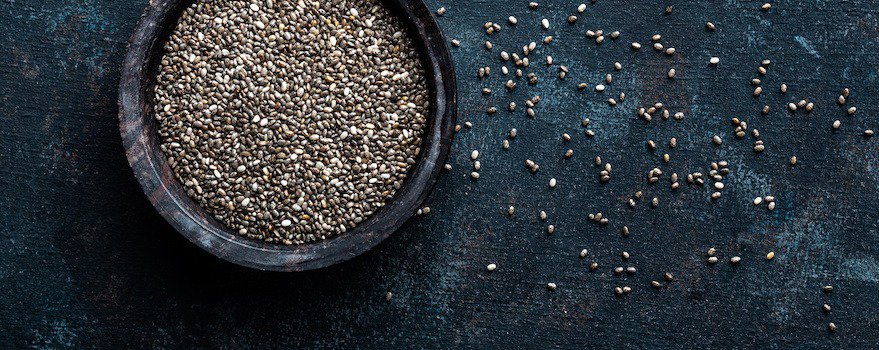
Fats are essential to the body. They are a source of energy and part of the structural composition of skin cells and nerve cells.
Omega-3s are excellent fats because they help raise good cholesterol. They are essential for proper brain function and eye health.
Ideal fats: dried fruits like Brazil nuts contain omega-3 and omega-9. Nut butters (almonds, walnuts…) are easy to spread on a slice of bread! They are rich in unsaturated fatty acids.
Eggs, herring, and salmon are good sources of omega-3s. Chia seeds (very high in fiber) and flax seeds are too.
To summarize
- Une boisson chaude : thé vert, matcha, cacao, chicorée, rooibos…
- Des protéines : oeufs, kéfir, spiruline, soja, pois chiches…
- Un fruit frais : abricot, melon, cassis, kiwi, grenade, pomme selon saison…
- De bons glucides : muesli et céréales complètes non raffinées comme l’avoine, pain au levain, pain aux céréales…
- De bons lipides : noix, amandes, noix du Brésil, graines de chia, graines de lin…
Recommendations from the National Nutrition and Health Program
On the site mangerbouger.fr you can find recommendations for the composition of breakfast:
- 1 produit céréalier tel que du pain complet ou aux céréales, des céréales pas trop sucrées.
- 1 produit laitier tel qu’un verre de lait, un yaourt ou du fromage blanc.
- 1 fruit entier ou pressé en jus.
- 1 boisson pas trop sucrée (café, thé, eau)
The cereal product has been adjusted in our carbohydrate recommendations to avoid excluding carbohydrate-rich foods such as legumes, which can be enjoyed as hummus, for example.
We have substituted the dairy product with a food rich in plant or animal protein. Our recommendation includes dairy products but also suggests other protein sources such as eggs or seeds.
To meet ANSES’s calcium recommendations, you can include dairy products in other meals of the day. Some vegetables such as watercress and kale are rich in calcium.
For beverages, choose sugar-free options. However, if you want an additional source of carbohydrates, prefer alternatives to white sugar.
Unless contraindicated, we have added a source of fats to our list of foods to include in a balanced breakfast.


